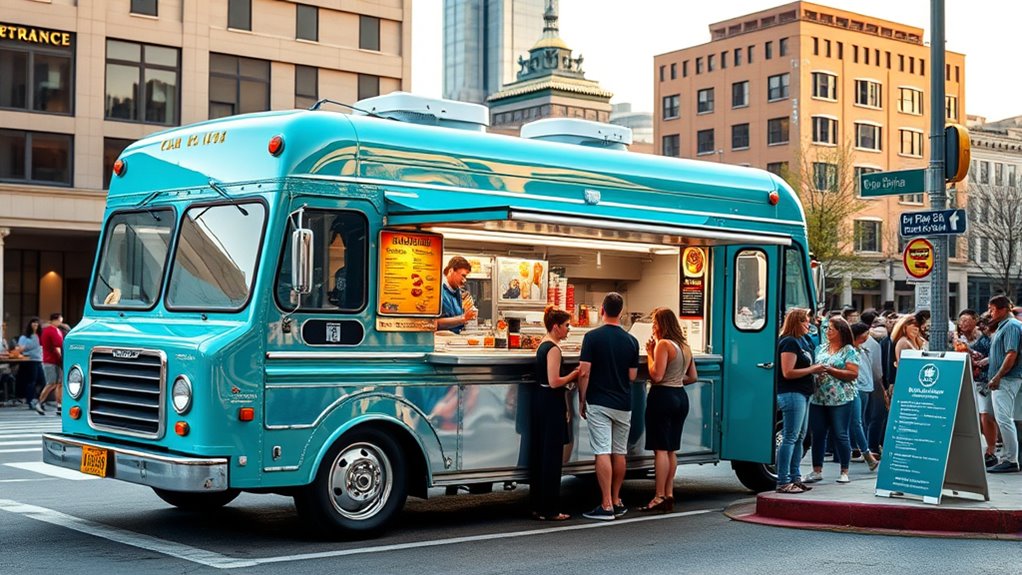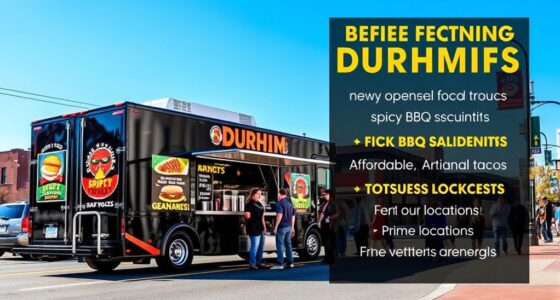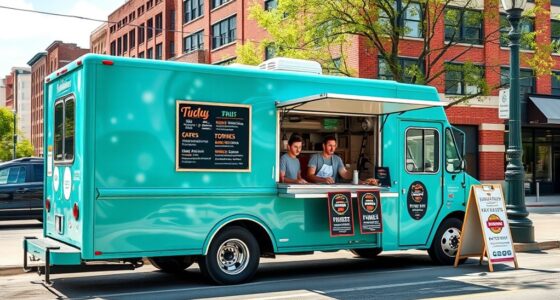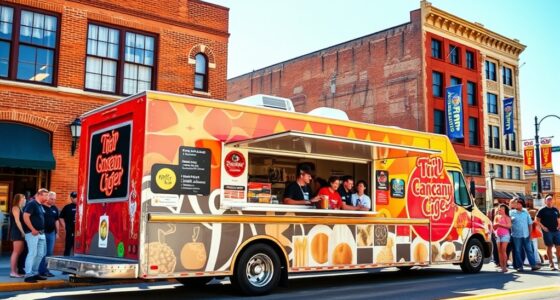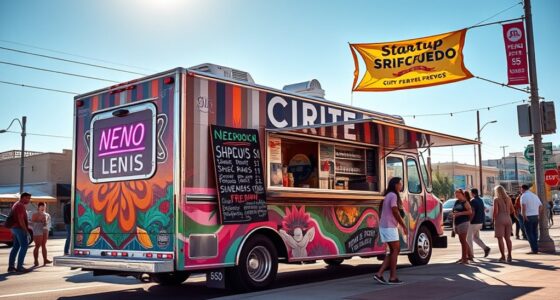To open a food truck in Chattanooga, you need permits from the Chattanooga Department of Transportation, Tennessee Department of Health, and a business license from the Tennessee Department of Revenue. Costs vary: trucks can be $40,000 to $150,000, plus licensing, insurance, and equipment. You’ll operate in designated zones, like parks or parking lots, and develop a menu that complies with health regulations. Smart marketing via social media and local events can boost your success. Keep exploring to get all the details you need.
Key Takeaways
- Obtain necessary permits from Chattanooga Department of Transportation, Tennessee Department of Health, and Tennessee Department of Revenue for licensing and operation.
- Startup costs vary from $40,000 to $150,000 for trucks, plus additional expenses for equipment, inventory, licenses, and insurance.
- Operate within designated Mobile Food Unit zones, ensuring compliance with location, sidewalk width, and movement regulations.
- Develop a compliant menu following state health regulations, emphasizing simplicity, local inspiration, dietary options, and visual appeal.
- Use social media, participate in local events, and implement loyalty programs to boost visibility, customer engagement, and sales growth.
Navigating Permits and Licensing Requirements in Chattanooga
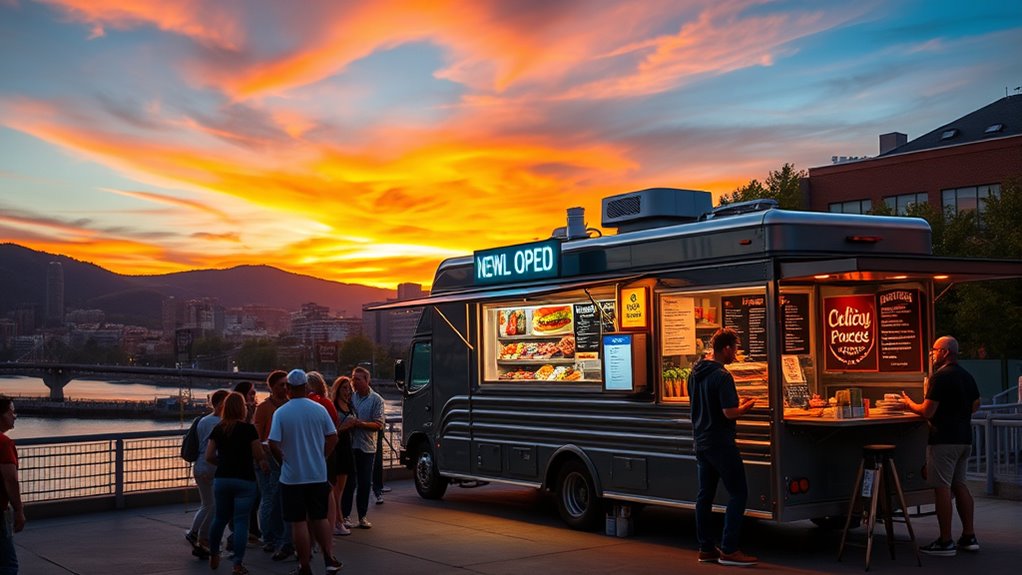
Navigating permits and licensing requirements in Chattanooga can seem complex, but understanding the process is essential for legal and smooth operation of your food truck. You’ll need a Mobile Food Unit (MFU) permit from the Chattanooga Department of Transportation (CDOT) to vend within designated MFU zones. The Tennessee Department of Health issues two permits: one for mobile units and another for farmers markets. Your city permit is valid for up to 365 days, costing between $100 and $500. You must also obtain a business license from the Tennessee Department of Revenue and secure special event permits for food truck rallies. Be prepared to submit detailed applications, site plans, health inspection results, proof of insurance, lease agreements, and other documentation to ensure compliance with local, state, and federal regulations. Understanding local regulations can help prevent potential delays or legal issues.
Estimating the Costs to Launch Your Food Truck Business
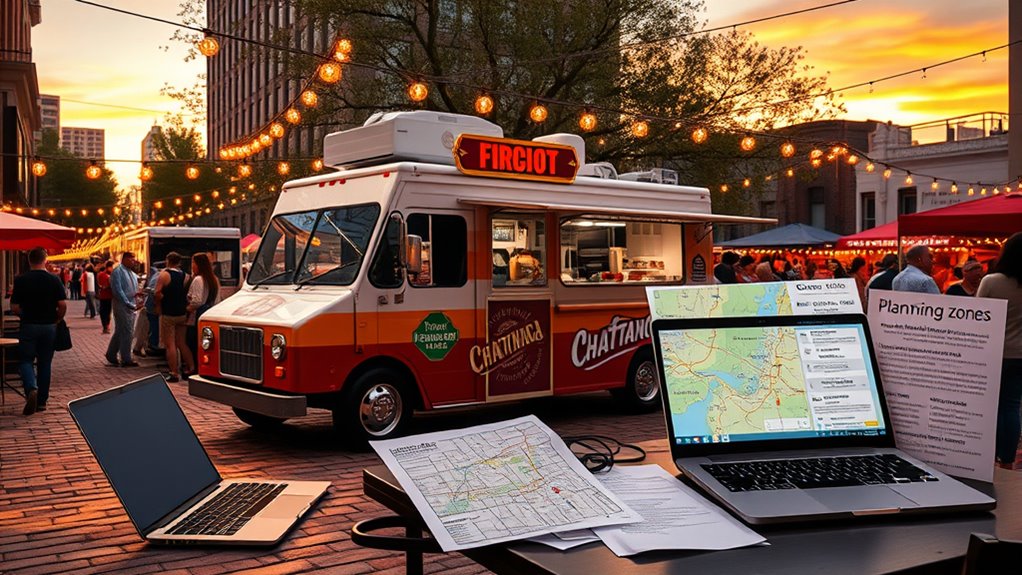
Launching a food truck business requires careful financial planning to cover various startup costs. The truck itself can cost between $40,000 and $150,000, depending on size, condition, and modifications. Outfitting your truck with grills, fryers, and refrigerators might be included or add extra expenses if retrofitting an existing vehicle. Expect to spend around $2,000 to $3,000 on initial inventory and about $300 on serveware to prepare for opening day. Fuel and maintenance costs typically range from $500 to $1,000 monthly, impacting your ongoing budget. Don’t forget insurance, safety equipment, and licensing fees, which vary based on coverage and compliance requirements. Investing in POS systems, branding, and staff training will also add to your upfront costs, ensuring you’re fully prepared to launch. Planning for all expenses helps prevent unexpected financial surprises and keeps your business on track from day one. Additionally, understanding bedroom design principles can be helpful if you plan to create a welcoming space for staff or customers in your business setup.
Securing Approved Operating Locations and Zones

Have you identified where your food truck can legally operate in Chattanooga? You’ll need to operate only within designated Mobile Food Unit (MFU) Zones approved by the city. These zones are limited to seven days per location, requiring you to move periodically. They must be adjacent to sidewalks at least five feet wide, with vending only allowed from the sidewalk side to pedestrians. Locations include public spaces like parks, city parking lots, and recreation centers, but each site needs approval from the Chattanooga Department of Transportation, Youth and Family Development, or Parks and Recreation. To operate, you must submit a detailed site plan with your MFU Zone application. Remember, operating outside these zones or violating rules can result in fines, permit revocation, or legal penalties. Proper maintenance of your mobile unit, including regular cleaning, is essential to ensure compliance and smooth operation within these designated zones.
Crafting a Compliant and Appealing Menu
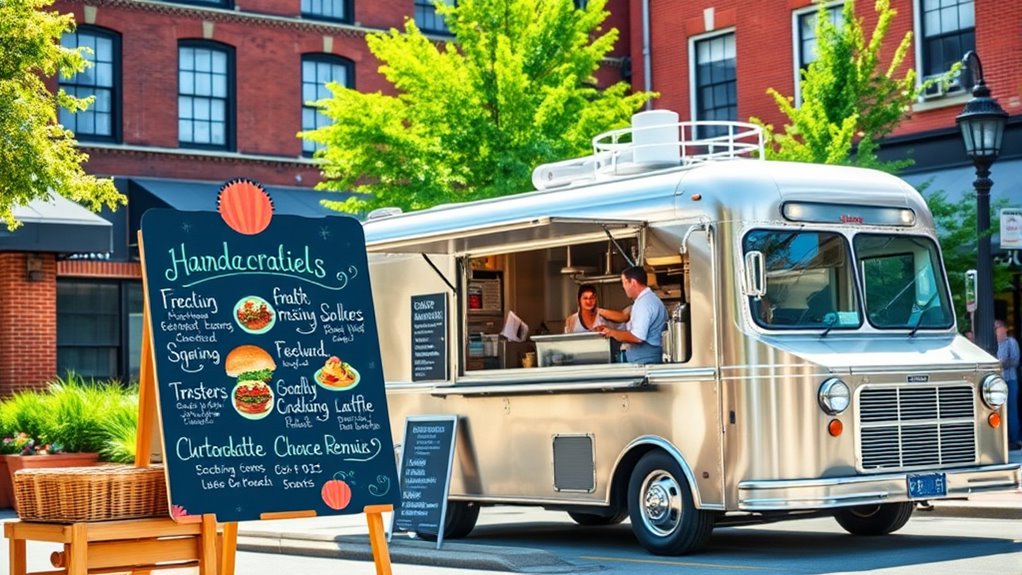
After securing your approved operating locations, focusing on your menu is key to running a compliant and appealing food truck. You must develop a menu that follows Tennessee Department of Agriculture and Health regulations, ensuring safe food handling and proper labeling. Consider permits related to your food categories and municipal health standards for ingredient sourcing and preparation. Address dietary restrictions by including vegetarian, gluten-free, and allergen-sensitive options, and offer culturally respectful items to broaden your customer base. A well-designed menu should match your truck’s equipment and operational capacity, balancing simplicity with variety. Here’s a quick overview:
| Menu Elements | Key Considerations |
|---|---|
| Dietary accommodations | Vegetarian, gluten-free, allergen info |
| Signature items | Unique, locally inspired, appealing |
| Pricing strategies | Cost, competition, value |
| Menu simplicity | Efficient prep, waste reduction |
| Visual presentation | Photos, descriptions, customer engagement |
You should also consider menu flexibility to adapt to ingredient availability or customer preferences on any given day, which can help you stay compliant and maintain customer satisfaction.
Effective Marketing Strategies to Grow Your Food Truck Brand
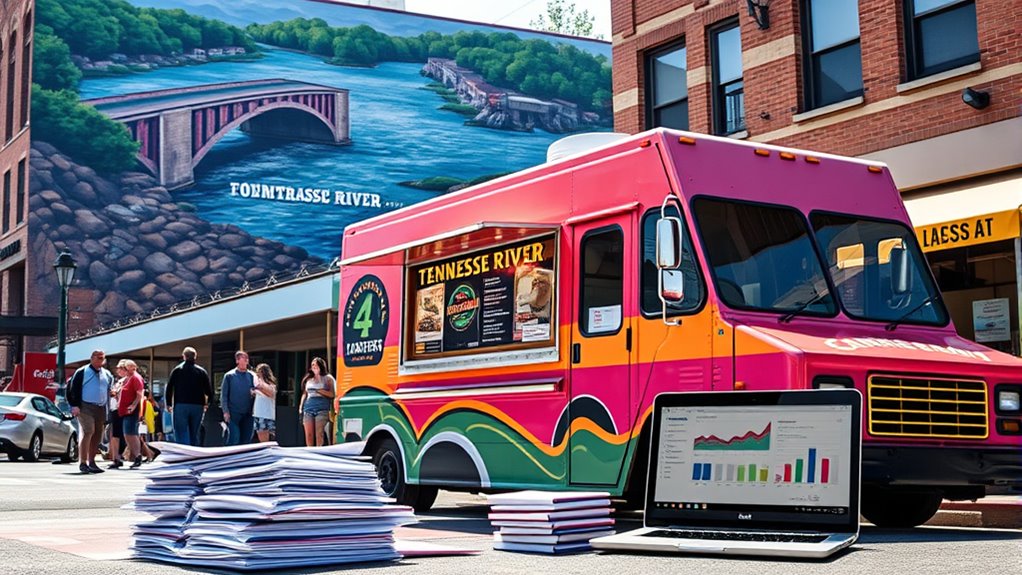
To effectively grow your food truck brand, leveraging social media platforms is essential, as they offer direct and cost-efficient ways to reach your target audience. Facebook is the most popular platform, with 75% of food trucks using it for marketing. Active social media campaigns can boost sales by 20% and increase customer spending by around 15%. Additionally, 40% of customers discover their favorite trucks through social media ads, making it a key customer acquisition tool. Beyond social media, participating in local events and festivals increases visibility, with 80% of trucks attending at least three annually. Using data analytics and mobile apps can improve your marketing ROI by 25%, while loyalty programs help drive repeat business, fostering long-term growth and brand loyalty. Effective digital marketing strategies play a crucial role in expanding your customer base and building a recognizable brand presence. Incorporating brand storytelling into your content can also strengthen customer connections and enhance loyalty.
Frequently Asked Questions
How Long Does the Permit Approval Process Typically Take in Chattanooga?
You’re probably wondering how long the permit approval process takes in Chattanooga. It varies depending on your application’s completeness and specific requirements. Usually, inspections happen within a few weeks after submission, but if you need to handle petitions or council notifications, it can take several more weeks. Overall, expect the process to last from a few weeks up to several months, so early preparation helps speed things along.
Are There Any Restrictions on the Types of Cuisines Permitted in Chattanooga Food Trucks?
You wonder if Chattanooga limits the cuisines you can offer with your food truck. There are no specific restrictions on cuisine types, so you’re free to serve anything from tacos to sushi. However, you must follow health and safety regulations, ensuring proper food handling and sanitation. Location and event rules might influence your menu practicality, but overall, Chattanooga allows a wide variety of cuisines as long as you meet safety standards.
Can I Operate My Food Truck Outside Designated MFU Zones During Special Events?
You can’t operate your food truck outside designated MFU zones unless you get a special event permit. During special events, the city allows exceptions, but you must follow all rules and obtain the proper authorization. This includes adhering to safety, insurance, and location regulations. If you don’t, you risk fines, permit suspension, or revocation. Always plan ahead, secure your permits, and coordinate with event organizers to stay compliant.
What Are the Specific Health Inspection Requirements for Mobile Food Units?
You need to guarantee your mobile food unit passes health inspections to operate legally. This means maintaining clean food prep areas, using safe food handling practices, and keeping electrical, water, and sanitation systems functional. If you use propane or natural gas, the Chattanooga Fire Department must inspect these systems. You’re also required to display inspection results on your unit at all times, so you meet all health and safety standards.
How Can I Find Local Partnerships to Expand My Food Truck’S Visibility?
To find local partnerships that boost your food truck’s visibility, start by connecting with organizations like Kitchen Incubator of Chattanooga, which offers networking events, shared spaces, and business support. Collaborate with nonprofits like LAUNCH Chattanooga and financial institutions such as TVFCU for funding and community events. Engage with neighborhood events, food markets, and local businesses for catering opportunities. Use social media, local influencers, and food bloggers to expand your reach and attract more customers.
Conclusion
Starting your food truck in Chattanooga is like planting a seed—you need permits, a solid plan, and a tasty menu to grow. When I first launched my truck, I discovered that maneuvering the permits was like watering a delicate plant; it takes patience. But with the right location and marketing, your business can flourish just like that vibrant garden. Stay persistent, and soon your food truck will be a beloved fixture on Chattanooga’s streets.
